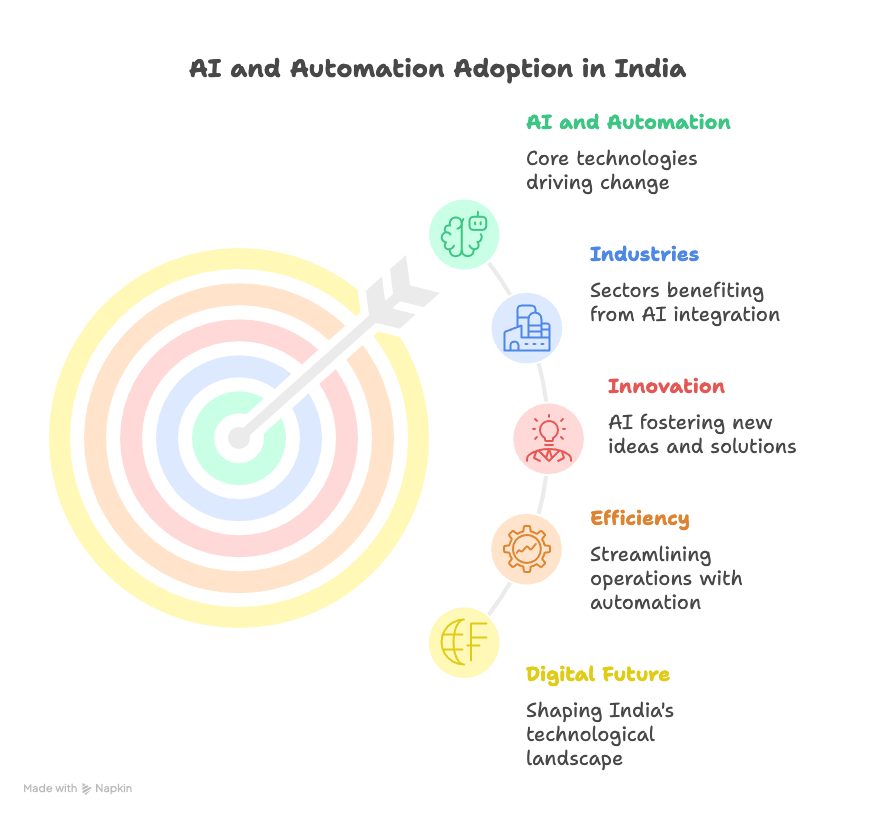The adoption of AI and automation in India represents one of the most transformative shifts in the country’s IT landscape. As the global digital economy evolves rapidly, India is emerging as a key player in integrating intelligent technologies across diverse industries. From startups to established enterprises, AI-driven solutions and automation tools are reshaping workflows, driving innovation, and enhancing operational efficiency. This article explores how this technological shift is unfolding, the factors accelerating adoption, challenges faced, and the implications for the future of India’s IT sector. Understanding these dynamics offers valuable insights into why AI and automation are not just trends but foundational elements setting the course for India’s digital future.
Growing demand for AI and automation in Indian IT
The surge in AI and automation adoption is primarily fueled by India’s expanding IT services sector and its role as a global outsourcing hub. Companies seek to enhance productivity and reduce costs by automating repetitive tasks such as data entry, customer service, and software testing. Additionally, AI-powered analytics, machine learning models, and natural language processing solutions are increasingly integrated into business processes to unlock insights and improve decision-making.
According to recent industry reports, over 70% of Indian IT firms have implemented at least one AI or automation technology in their workflows. This transition is supported by a growing talent pool skilled in data science, AI programming, and cloud computing, making India a preferred destination for AI-driven digital transformation projects.
Government initiatives and ecosystem support
Government policies and initiatives play a crucial role in accelerating AI adoption. Programs like Digital India and the National AI Strategy aim to create an enabling environment, fostering innovation and collaboration between academia, industry, and startups. The creation of AI research centers and investment in skill development programs are helping build a sustainable AI ecosystem in the country.
Furthermore, state governments are launching AI-specific accelerators and innovation hubs to support local enterprises, making it easier for small and medium-sized businesses to leverage AI and automation technologies.
Challenges slowing widespread adoption
Despite rapid progress, several hurdles remain. One major challenge is the integration complexity of AI with legacy IT infrastructure, which many Indian companies still rely on. The cost of AI implementation and data privacy concerns also slow broader acceptance, particularly among small businesses.
Workforce readiness is another critical issue. While India has a large IT workforce, the skill gap in developing and managing AI systems is significant. Organizations face the dual task of hiring AI specialists and reskilling their existing employees to adapt to AI-powered tools.
Impacts on the future of IT jobs and innovation
The rise of AI and automation is dynamically reshaping job roles within the Indian IT industry. Routine and manual tasks are increasingly automated, leading to a shift towards more strategic, creative, and supervisory roles. This evolution encourages innovation, as companies invest more in AI research, product development, and new service offerings.
India’s position as a global IT hub is expected to strengthen as it integrates these advanced technologies, attracting international clients looking for cutting-edge solutions. Moreover, AI-driven startups are expanding rapidly, contributing to an innovation-driven economy that could redefine the IT landscape in the next decade.
| Aspect | Current scenario in India | Future outlook |
|---|---|---|
| AI adoption rate | 70% of IT firms use AI/automation | Estimated 90% adoption by 2030 |
| Government support | Multiple AI initiatives & strategies | Increasing funding & ecosystem expansion |
| Workforce skills | Growing but still insufficient | Improved through reskilling programs |
| Business impact | Improved efficiency & innovation | Higher automation, new growth avenues |
In conclusion, the adoption of AI and automation is indeed one of the biggest and most impactful shifts within India’s IT sector. It is driven by growing business demand, robust government initiatives, and an evolving workforce prepared to tackle the challenges of the digital age. While obstacles such as infrastructure integration, costs, and skill gaps persist, the overall momentum suggests a positive trajectory. The transformation is not only enhancing operational efficiency but also fostering innovation and new job roles, positioning India as a global IT powerhouse fueled by AI. As this paradigm continues to mature, companies and policymakers must collaborate closely to ensure inclusive growth and sustainable technology integration across the industry.

